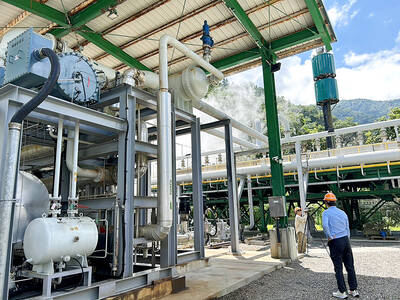The Walkman, the iconic Japanese electronic gadget, will no longer be made in Japan, Sony Corp announced yesterday, shifting the last production of the portable jukebox to China and Malaysia.
Sony will close its MD and CD player Walkman production lines at its Saitama Tech factory north of Tokyo by March next year, company spokeswoman Saori Takahashi said.
The factory produced Sony's first Walkman tape cassette players in 1979, which revolutionized the way the world listened to music at the start of the music-video era.
Sony, which has been struggling in the face of Apple Computer Inc's phenomenally popular iPod, will cut 200 jobs at the plant.
"The decision was based on our company's idea that we will concentrate on production in the best possible places in the world," Takahashi said.
Sony, like other Japanese companies, has increasingly relied on other Asian nations, particularly China, as hubs for low-cost manufacturing.
"The Walkman has long been a symbolic and strategic product for Sony, but it has now turned into just one item that should be produced overseas due to labor costs," said Masayuki Hoshina, an analyst at Okasan Research Institute.
"Japanese manufacturers will further differentiate high-value added products and low-value added ones," Hoshina said. "The former remain at home and the latter will be sent overseas. Such a trend will continue in the future, too."
Sony separately said it would also end production of cathode-ray tube displays in the US this year.
It will close its San Diego plant in June and lay off 400 employees there while ending production at its factory in Pittsburgh in February with 300 job losses.
It will focus on its production of cathode-ray tube displays in Singapore and China, Takahashi said.
In September last year, Howard Stringer, a Welsh-born former television journalist who is Sony's first foreign boss, announced a major overhaul of the business including 10,000 job cuts as the company struggles to cope with intense competition in key markets.
Sony has increasingly tried to repackage the Walkman, last year for example trying to target a younger crowd with a Walkman that looks like a jelly bean.
Sony has forecast shipments of the Walkman series at 13.85 million units for the year to March, up from 11.94 million the previous fiscal year.
Sony posted a net profit of ¥28.5 billion (US$247 million) for the three months to September, down 46.5 percent from a year earlier as restructuring charges of ¥32.9 billion contributed to the slide.

Taiwan’s exports soared 56 percent year-on-year to an all-time high of US$64.05 billion last month, propelled by surging global demand for artificial intelligence (AI), high-performance computing and cloud service infrastructure, the Ministry of Finance said yesterday. Department of Statistics Director-General Beatrice Tsai (蔡美娜) called the figure an unexpected upside surprise, citing a wave of technology orders from overseas customers alongside the usual year-end shopping season for technology products. Growth is likely to remain strong this month, she said, projecting a 40 percent to 45 percent expansion on an annual basis. The outperformance could prompt the Directorate-General of Budget, Accounting and

Two Chinese chipmakers are attracting strong retail investor demand, buoyed by industry peer Moore Threads Technology Co’s (摩爾線程) stellar debut. The retail portion of MetaX Integrated Circuits (Shanghai) Co’s (上海沐曦) upcoming initial public offering (IPO) was 2,986 times oversubscribed on Friday, according to a filing. Meanwhile, Beijing Onmicro Electronics Co (北京昂瑞微), which makes radio frequency chips, was 2,899 times oversubscribed on Friday, its filing showed. The bids coincided with Moore Threads’ trading debut, which surged 425 percent on Friday after raising 8 billion yuan (US$1.13 billion) on bets that the company could emerge as a viable local competitor to Nvidia

BARRIERS: Gudeng’s chairman said it was unlikely that the US could replicate Taiwan’s science parks in Arizona, given its strict immigration policies and cultural differences Gudeng Precision Industrial Co (家登), which supplies wafer pods to the world’s major semiconductor firms, yesterday said it is in no rush to set up production in the US due to high costs. The company supplies its customers through a warehouse in Arizona jointly operated by TSS Holdings Ltd (德鑫控股), a joint holding of Gudeng and 17 Taiwanese firms in the semiconductor supply chain, including specialty plastic compounds producer Nytex Composites Co (耐特) and automated material handling system supplier Symtek Automation Asia Co (迅得). While the company has long been exploring the feasibility of setting up production in the US to address

Taiwan should increase its geothermal development investment, as its stable output could complement the nation’s fast-growing solar and wind power capacity, an international consultant said last week. COWI A/S Asia-Pacific business development director Vun Pui-lee (溫沛理) at an event hosted by the Trade Council of Denmark, Taipei said that geothermal systems offer consistent heat flow and round-the-clock generation. “The output of geothermal power is like natural gas; the volume of hot water you have and its temperature are both stable and constant,” he said. Such steadiness could enhance Taiwan’s energy resilience during geopolitical uncertainty, he added. “A liquefied natural gas terminal might not be